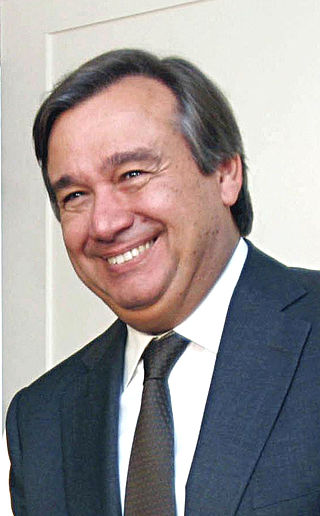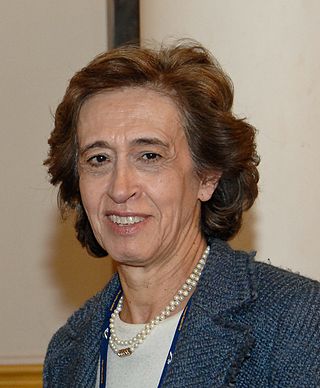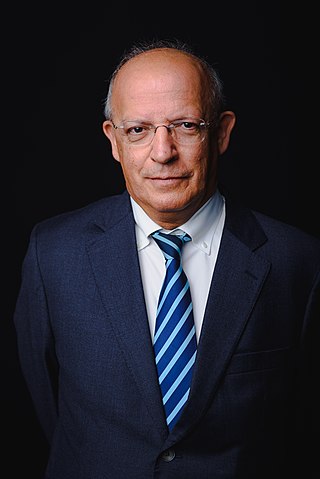
The Socialist Party is a social-democratic political party in Portugal. It was founded on 19 April 1973 in the German city of Bad Münstereifel by militants who were at the time with the Portuguese Socialist Action. The PS is a member of the Socialist International,Progressive Alliance and Party of European Socialists,and has nine members in the European Parliament within the Progressive Alliance of Socialists and Democrats group during the 9th European Parliament. It has been the governing party of Portugal since November 2015,subsequently winning the 2019 and 2022 legislative elections.

The 1999 Portuguese legislative election took place on 10 October. The election renewed all 230 members of the Assembly of the Republic.

The 2002 Portuguese legislative election took place on 17 March. The election renewed all 230 members of the Assembly of the Republic.

The 2009 Portuguese legislative election was held on 27 September,to renew all 230 members of the Assembly of the Republic. The Socialist Party,led by incumbent Prime Minister JoséSócrates,won the largest number of seats,but didn't repeat the overall majority they gained in 2005.

Augusto Ernesto dos Santos Silva is a Portuguese sociologist,university professor,and politician who has been the President of the Assembly of the Republic since 2022,in the 15th Legislature. From November 2015 to March 2022,he was the Portuguese Minister of Foreign Affairs,in the XXI and XXII Constitutional Governments led by Prime Minister António Costa.

Idália Serrão is a Portuguese politician who has also worked as a violinist and television producer and is now a board member of a leading Portuguese bank.
Joana Ferreira Lima is a Portuguese politician. As a member of the Portuguese Socialist Party (PS),she was elected as a deputy to the Assembly of the Republic for 2005 to 2009 and 2015 to 2019 and was re-elected in 2019 and 2022.
Francisca Almeida is a Portuguese lawyer and politician. As a member of the Social Democratic Party,she represented the Braga constituency in the 11th and 12th legislatures of the Assembly of the Republic of Portugal,between 2009 and 2015.

Catarina Marcelino is a Portuguese anthropologist and politician. She served as Secretary of State for Citizenship and Equality in the 21st Portuguese Constitutional Government between 2015 and 2017 and was a deputy in the Assembly of the Republic of Portugal from 2009 to 2020,when she left in order to fill the position of vice-president of the Instituto da Segurança Social.
Maria Begonha is a Portuguese politician,a member of the Portuguese Socialist Party (PS),and a former member of the Assembly of the Republic. She served as secretary-general of Socialist Youth from 2018 to 2020.

The 2026 Portuguese presidential election will be held in January. This election will elect the successor of President Marcelo Rebelo de Sousa,as he is barred from running for a third term.

Susana Amador is a Portuguese jurist and politician. As a member of the Portuguese Socialist Party (PS),she briefly became a deputy in the Portuguese Assembly of the Republic in 2005. She was elected to the Assembly again in 2015 and re-elected in 2019 and 2022. Between 2005 and 2015 she was a member of the Lisbon Metropolitan Council and mayor of Odivelas,a municipality in the Lisbon area. In 2019 she served as the Secretary of State for Education.

Isabel Oneto is a Portuguese politician. As a member of the Portuguese Socialist Party (PS),she has been a deputy in the Portuguese Assembly of the Republic from 2009 to 2015 and from 2019 to the present,representing Porto. Between 2017 and 2019 she served as Assistant Secretary of State and Internal Administration.
Rosário Gambôa is a Portuguese politician. As a member of the Portuguese Socialist Party (PS),she has been a deputy in the Portuguese Assembly of the Republic since 2019,representing Porto. Prior to that,she was president of the Polytechnic Institute of Porto (IPP),a tertiary-level institute with 15,000 students.
Sofia Andrade is a Portuguese politician. As a member of the Portuguese Socialist Party (PS),she became a deputy in the Portuguese Assembly of the Republic,representing the Porto District,in 2021,following the resignation of one of the incumbents,and was re-elected in the January 2022 election.
Eurídice Pereira is a Portuguese politician who was trained in sociology. As a member of the Portuguese Socialist Party (PS),she was first elected as a deputy in the Portuguese Assembly of the Republic in 2009,representing the Setúbal District,and has been re-elected in every national election since then,including the most recent in January 2022. She has also held many other administrative and political positions.
Maria da Luz Rosinha is a Portuguese politician. As a member of the Portuguese Socialist Party (PS) she has been a deputy in the Portuguese Assembly of the Republic between 1995 and 1998 and from 2015 to the present. She has also been a member of the national secretariat of the PS and mayor of the municipality of her birthplace,Vila Franca de Xira.
Sofia Matos is a Portuguese politician. A member of the centre-right Social Democratic Party (PSD),Matos was elected to the Assembly of the Republic of Portugal in 2019 as a representative of the Porto constituency and re-elected in 2022,when she headed the PSD list for Porto.

Lisbon is one of the 22 multi-member constituencies of the Assembly of the Republic,the national legislature of Portugal. The constituency was established in 1976 when the Assembly of the Republic was established by the constitution following the restoration of democracy. It is conterminous with the district of Lisbon. The constituency currently elects 48 of the 230 members of the Assembly of the Republic using the closed party-list proportional representation electoral system. At the 2022 legislative election it had 1,919,958 registered electors.

Porto is one of the 22 multi-member constituencies of the Assembly of the Republic,the national legislature of Portugal. The constituency was established in 1976 when the Assembly of the Republic was established by the constitution following the restoration of democracy. It is conterminous with the district of Porto. The constituency currently elects 40 of the 230 members of the Assembly of the Republic using the closed party-list proportional representation electoral system. At the 2022 legislative election it had 1,589,053 registered electors.











